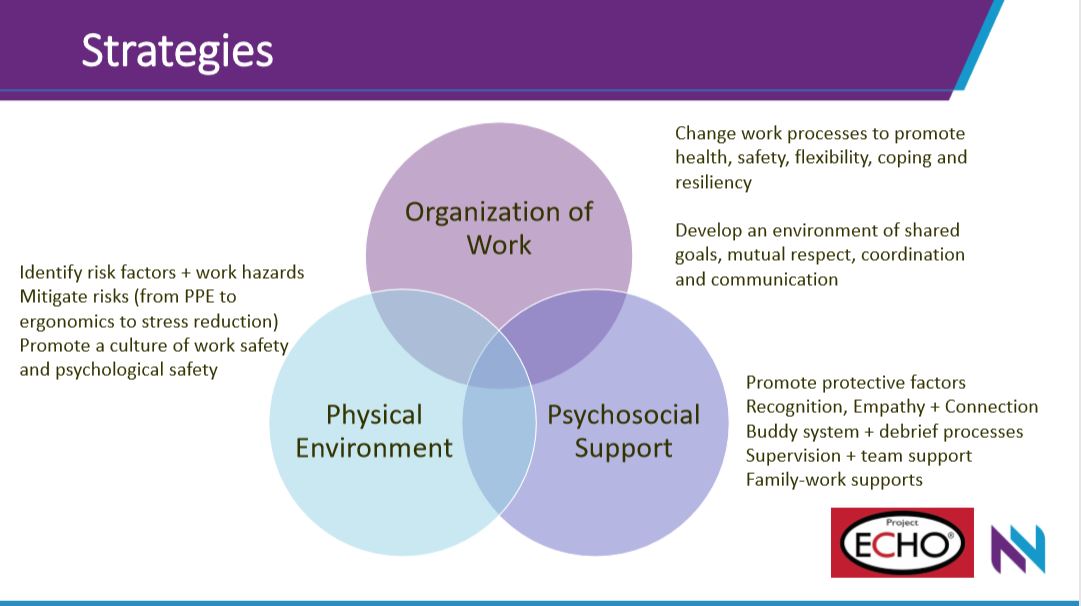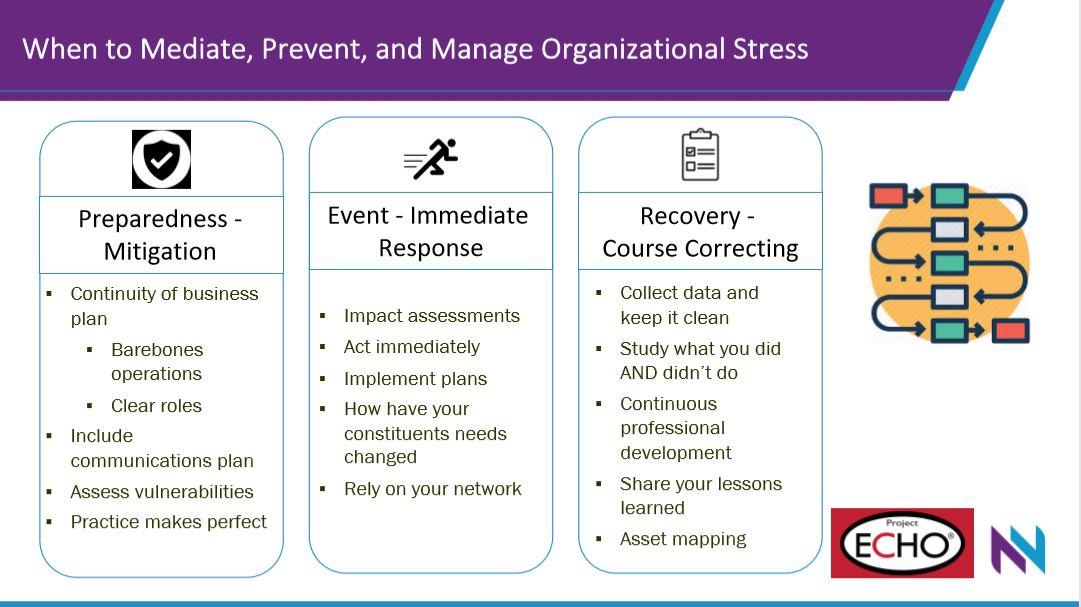Public Health Workforce Resilience Echoes Across the Country: NNPHI’s Resilience ECHO Series
- By: Isabella Kaser
- Date
Soon after we began to understand the real threats of Covid-19 to our nation’s health and livelihood, the concept of “resilience”—which had mostly been confined to discussions about disaster preparedness, response, and recovery— rapidly spread through the public health field. UCLA Fielding School of Public Health’s Center for Public Health and Disasters defines community resilience as the ability of a community to “withstand and to recover from adversity in the event of a disaster.” This involves engagement of community-based organizations in preparedness, response and recovery planning activities. The American Psychological Association says that on the individual level, resilience is the process of adapting well in the face of adversity, trauma, tragedy, threats or significant sources of stress. Whether we’re talking about communities or individuals, most frameworks for resilience convey an ability to “bounce back” from adversity, whether it be adverse childhood experiences, natural disasters, or as in the current case, the rapid spread of an infectious disease.
The Resilience ECHO Series, a National Network of Public Health Institutes (NNPHI) project, focuses on enhancing individual, workforce and organizational ability to cope with and transform itself in the face of the national pandemic. Using Zoom videoconferencing technology, NNPHI staff facilitate a six-week series of weekly conversations, which incorporate both resiliency curriculum and discussions among ECHO participants about challenges, resources and their first-hand experience applying the learning concepts.
This is the most useful (learning) series I have ever attended. It provided actual life skills you could apply immediately. – A participant in the May-June Resilience series.
The series was originally designed by Dr. Joe Barbera and Dr. Brian Flynn for NNPHI’s Hurricane Response Hub. The series gave participants tangible strategies to reduce and manage the personal, workforce, and organizational stressors public health and emergency management professionals experience during hurricane response and recovery.
NNPHI rapidly adapted the content and curriculum to support the larger public health workforce impacted by COVID-19. The curriculum was modified from its original hurricane focus to address all public health crises, and participants from across public health concentrations were invited to participate. ECHO series usually include a small cohort of about 20 participants, but the need and demand increased participation by nearly 750 percent to over 147. The series provided people with tangible strategies to increase resilience, but also a safe space to share stories, learn, and reflect together.
Resilience ECHO Series Curriculum Topics
Individual stressors in extended incidents
Professional/workforce stressors in extended incidents
Organizational stressors for the workforce: interventions
Individual, workforce and organizational stressors: recovery interventions
Randy Domina, a public health systems improvement workforce development coordinator for the Connecticut Department of Public Health, participated in every session of the most recent series. He shared the knowledge he’s received with over 700 people in his department through bulletins called Workforce Enhancement Communications Aiding Resiliency Efforts (WE CARE). “The information shared in the initial sessions allowed me to anticipate what staff might be experiencing in the near term and give them resources to be more resilient,” Domina said. “The information from the last few sessions has helped me think about what staff are going to need to be resilient for the long-run:
Before and After series knowledge check:
- 91% increase in survey respondents rating of their ability as expert to develop an actionable strategy and specific stressor management ideas that can be applied within their sphere of influence, including self, workforce, and response organization.
- 92% increase in survey respondents rating of their ability as an expert to serve as a local resource within their workplace or community for the topic of individual and workforce resiliency.
- 08% of survey respondents indicated their knowledge as “competent” or “expert” to describe the range of approaches to promote individual resilience.
- 38% of survey respondents indicated their knowledge as “competent” or “expert” to describe the range of approaches to promote workforce resilience.
Overall series and content feedback:
- 54% of survey respondents “agreed” with the following statement: I have identified actions I will take to apply information I learned from this ECHO series in my work.
- 21% of survey respondents “agreed” with the following statement: I was satisfied with this series overall.
- The presentations were all excellent. The information usually came via real-world examples and followed with actionable steps. The ideas provided weren’t just theoretical, they were practical and applicable to our everyday work.
- Appreciated hearing the real-life events folks have endured/ experienced and techniques, tools and strategies that have incorporated into their practice /personal life and work life to help them remain “grounded” through challenging times.
- Case/experience presentations allows the empathy component to be demonstrated and provides empathy and a sense of understanding and belonging. This enhances the “trust factor”
- This is the most useful webinar series I have ever attended. It provided actual life skills you could apply immediately.
Like Domina, many returned to this ECHO series more than once. In fact, between 45 and 73 people participated on each call. They have shared ideas on how to maintain focus, connect, and function while fulfilling grant deliverables in this environment of substantial disruption. Professionals from 38 states and territories representing a broad range of agencies participated, including local state and federal agencies (e.g. Centers for Disease Control and Prevention, Department of Health and Human Services) hospital systems, primary care associations, foundations, public health institutes and national member organizations (e.g. American Public Health Association, the Association of State Territorial Health Organizations, National Association of City and County Health Officials and the Public Health Accreditation Board).
Like an echo, collaborative learning within the workforce creates a wave that transfers energy that first enhances organizational resilience and then ripples out to community. Deloitte Global CEO Punit Renjen aptly explains what NNPHI is seeking to accomplish in a recent series of blog posts that describe a truly resilient organizations as an entity “that has transformed, having built the attitudes, beliefs, agility, and structures into its DNA that enable it to not just recover to where it was, but catapult forward—quickly.” This resonates both with NNPHI’s actions related to the ECHO series and the participating agencies.
NNPHI uses this and other ECHO series to address the Public Health 3.0 workforce needs related to strategic thinking, systems perspective, strategic partnerships, harnessing the power of new data types and meeting new population health challenges, including building individual, organizational, and community resilience.
With a network consisting of over 45 member institutes, 10 university-based regional training centers and 40 affiliates engaging and supporting over 500,000 public health professionals nationwide, NNPHI been able to identify, develop, and distribute a wide range of learning resources and opportunities that help strengthen the public health workforce. As an early adopter of Project ECHO for public health, NNPHI is leading the effort to establish a national infrastructure for ongoing workforce development and the advancement of public health through virtual communities of practice called ECHO Public Health.

 Subscribe To Our Communications
Subscribe To Our Communications